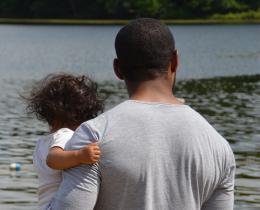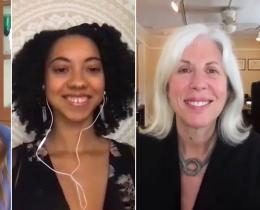Omega: How can we learn to communicate better with each other in these polarized times?
Adyashanti: Lots of people are saying what we need is to have a deeper, richer cultural conversation about the issues facing the country. It's easy to say that, but what does that mean?
I think it means that we start by admitting that we may not have all of the answers. Right now, especially in politics, everyone is fairly certain that their way of looking at things is the right way. Even with these big political and cultural issues, we have to become honest and say, “Maybe I don't know.”
For example, if we ask the question, “What do we do about the racial strife in this country,” immediately, if you're sensitive, you know that you don't have the whole answer. You don't really know. If you stop there for a moment, you can sometimes feel the mind opening to possibilities. To me this is what the practice of inquiry is for. It is to open the door for possibilities, not for our mind to jump in and immediately tell us the answers.
Omega: How do we know what to say to someone if we’re in that “I don’t know” place?
Adyashanti: Dialogue happens in a creative space. Instead of arguing, instead of one side trying to convince the other side that it's right, we need to be willing to enter into a creative dialogue together. We need to do this even with people we disagree with quite strongly, otherwise, we're not going to get anywhere.
Even if your viewpoint wins the day and becomes part of the policy or the right person is elected, or whatever, that doesn't mean the underlying tensions that are creating all of this have been changed in any way. This is what's been disappointing about politics right now—and why people are reacting the way they're reacting. Because election after election, leader after leader, there is hope followed by disappointment.
But we blame our disappointment on stuff out there. It's the politicians, it’s their fault. But it's all of us who are now pointing fingers just as much as the politicians. We are just as divided as they are, and we have to admit that.
We need to enter into a much more open creative space, otherwise, I think what we're seeing now is just the beginning. It can get way worse than this, and sometimes reflecting on that can make us either afraid or it can motivate us to take a new approach.
Omega: What does it mean to be in creative dialogue with each other?
Adyashanti: This type of dialogue allows for something to arise out of the conversation that perhaps nobody brought to the table. Real relationship can be magical and creative like that. In the Bible, Jesus says, “Where two or three gather in my name, there I am.” This is a way of saying that something dynamic can happen that’s bigger than both of you.
When you truly connect with someone else, even somebody who doesn’t share your viewpoint, there’s a third thing that starts to spin between you. This third thing starts to emerge, and when people notice it, they start to think, “We might really have a chance.” But we've got to let go of our judgment and our certainty to get there.
Even when we’re connected, that doesn’t mean we’re going to have the same ideas. Bad ideas flow out of a lack of connection. If there isn’t consensus, it’s a sign we’re not connecting. When we’re connected, I’ve found that there is, at the end of the day, usually consensus.
I've seen this happen over and over in my own life when I’m willing to enter into that creative dialogue. Often when I walk away, the resolution is not identical to what I came with to the dialogue. It's something different that showed up through the dynamic interaction.
We're losing what it means to be in creative, dynamic interaction, and I think we're losing it because we're afraid. Until we can start to admit that, it's going to be hard to have that dialogue.
Omega: How can we begin to practice being in conversation this way?
Adyashanti: I often like to suggest that we practice with a small conversation. Even in conversations that are completely without consequence at all, if we really pay attention, sometimes it can be eye-opening when we see that we are trying to skew the conversation. We’re not listening, we’re just waiting for our turn to speak. Even in the most casual conversation, when we start to become aware of that, we can change it and make different decisions. That begins the process.
If we think that it’s just the politicians who have to do this, we're probably going to be disappointed. It begins in very simple human ways, and then we can start to up-level it. But that means that we have to stop blaming the politicians. There's only one way they got there—you and I put them there. So we have to take responsibility for that. Why did we do that? Why do we keep putting people in who don't want to have the conversation? I think all of that is important to ask, too.
Omega: Would you be willing to teach a communication workshop?
Adyashanti: The part I play in this is helping people find the level of intimate connection where conversation needs to arise from. To change conversation into something more creative, we have to be able to stay with ourself, to stay open and available. I work with getting people to stay in the present moment, in a field of intimate connection, where how you communicate will naturally be transformed.
Omega: How do we know if we’re communicating from a place of presence?
Adyashanti: When we are open, we become sensitive, and we can actually feel when a word comes out of our mouth that’s not connected. If you’re paying attention, you can tell the specific word where you left being connected with someone.
When I see that happen, I stop right in the middle of a sentence. I’ll sometimes do it when I’m teaching. I’ll be in front of a group of hundreds of people, and I’ll stop and I’ll just say, “I want to restate that,” because I can feel it’s not as connected as it could be. That’s groundwork stuff. That’s reorienting toward a felt sense of connectedness. And then the conversation can occur.
Is it always easy? No. Especially when you feel triggered and you're upset. To stop and feel connected takes some intention. It takes caring. It takes some acknowledgment that this is not always easy, but it is absolutely necessary.



